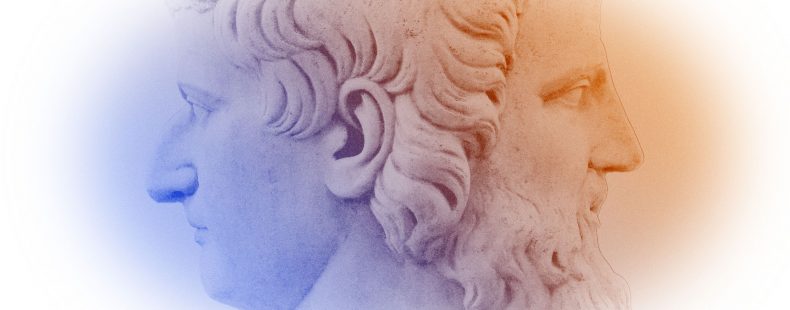Known for recaps and resolutions, each new year often starts with retrospection and … the month of January.
But where did the name January come from, and can we learn anything about the name of this first month to inspire us to actually keep those New Year’s resolutions intact?
What does January mean?
January, as we know, is the first month of the year and contains 31 days. The term originated before the year 1000 from Middle English, ultimately deriving from the Latin noun use of Jānuārius, equivalent to Jānus.
Who was Janus?
In ancient Roman culture, Jānus was a god of doorways, beginnings, and the rising and setting of the sun. His name comes from the Latin jānus, meaning “doorway, archway, arcade.”
Fun fact: the closely related Latin word jānua, meaning “door, doorway, entrance,” ultimately gives us the word janitor, which originally referred to a door attendant or porter before evolving to its more familiar sense of “custodian.”
There were many gateways in Rome where ceremonial entrances and exits were made, especially for the departure of the army on an expedition. As the god of transitions, Janus is often depicted with two bearded heads that face in opposite directions, looking to both the future and the past.
After 153 BCE, January (mensis Januarius in Latin) became the first month of the Roman calendar (which we adopted), the figure of Janus a perfect symbol for new beginnings.
WATCH: Where Did The Days Of The Week Get Their Names?
What does Janus-faced mean?
This ancient deity Janus has found his way into modern English in more ways than one. And as you might expect, his other lexical contributions are not entirely straightforward.
The versatile word Janus-faced can refer to someone or something’s capricious or seemingly contradictory nature. Or, it can be used with a more negative undertone to describe someone as deceitful and, well, two-faced.
What is a Janus word?
The two faces of Janus are also evident in the term Janus word, “a word that has opposite or nearly opposite meanings,” such as cleave and dust. (These are also called contronyms.)
To cleave something can mean to adhere closely to that thing, but it can also mean its opposite: to split, divide, or cut off. As a verb, dust can refer to the removal of dust, or the addition of it. (Think dust the cookies with confectioners’ sugar.)
Duality is embedded into all of Janus’s words, including the very language we use to talk about the beginning of the calendar year: January.
What do we celebrate in January?
We start the year with New Year’s Day—need some inspiration for your resolutions? (Or a reminder on where the apostrophe in New Year’s goes and why?) Every year since 1986, the United States has observed Martin Luther King Jr. Day on the third Monday in January. This national holiday honors a man who not only was an inspirational civil rights activist during the 1960s, but also one of the greatest orators of our time.
While there aren’t many official holidays in January, you can also take time to celebrate unofficial fun days such as dressing up your pet (January 14), popcorn (January 19), belly laughs (January 24), or kazoos (January 28).
If you were born around December 22–January 19, then you’re celebrating your status as a Capricorn, and you just might be idiosyncratic and genteel. Why is that? You’ll just have to find out: Celebrate The Season With These Words For Capricorns. Those born around January 20–February 18 are known as assertive and open-minded Aquarians.
Now go reflect on your last year and make plans for the new one ahead with full knowledge that January is meant to make us feel conflicted … it’s in its very name!














